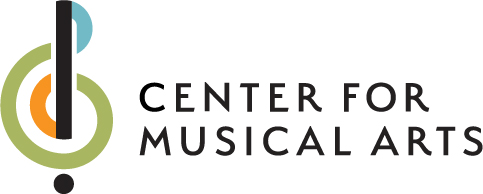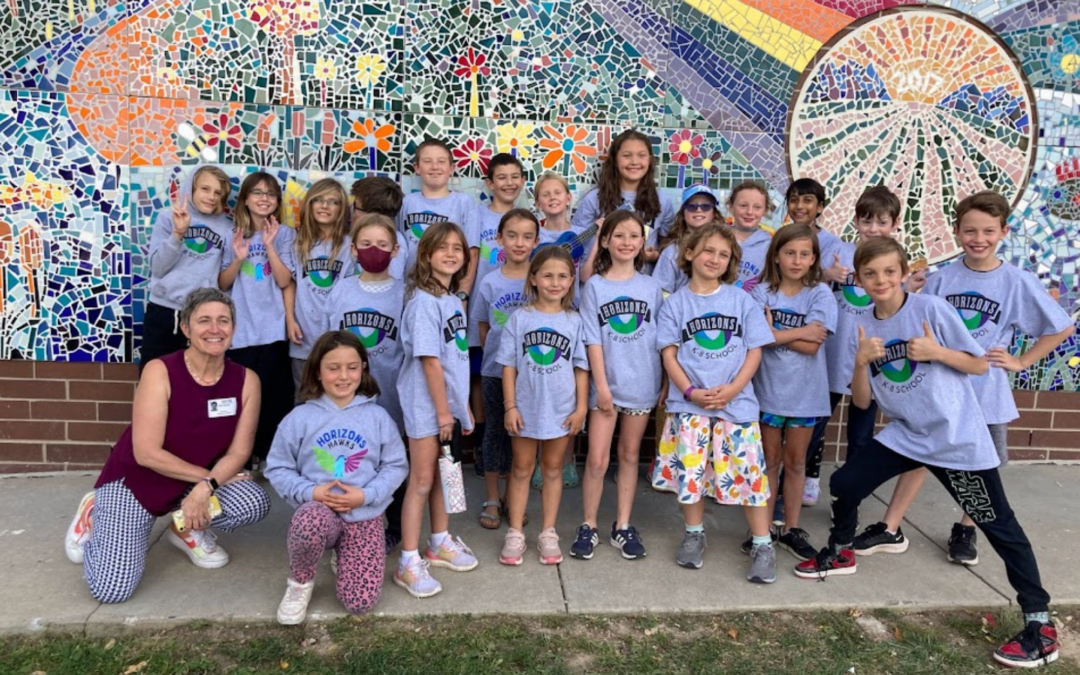The Center for Musical Arts is delighted to collaborate with teacher and mezzo-soprano Ellen Moeller on a 2024 summer mini-camp that invites K-12 students to create meaningful songs together over the course of a week. Learn more about the Eden Project and facilitator Ellen Moeller in our interview.
[photos provided by Ellen Moeller from a previous Eden Project pilot]
Center for Musical Arts: Hello, my name is Erica Reid. I’m with the Center for Musical Arts, and today I’m getting to know Ellen Moeller, who is a partner with an upcoming project with the Center. How are you doing, Ellen?
Ellen Moeller: I’m doing great, thanks.
Center: Well, first I want to say happy birthday! You let me know that today is your birthday. Thank you for making time for us today of all days to talk about this project.
Ellen: It’s fitting because it is kind of my big thing right now, my baby right now, so it’s perfect.
Center: Wonderful. Well, I want to hear all about your baby, but I want to start getting to know you first. You are a mezzo soprano, you’re a teacher, and you’re the liaison for the Eden Engagement, which we will talk about, but can you just tell us a little bit about what brought you to music in the first place?
Ellen: Sure, so I was one of those kids growing up, my parents always had the Metropolitan Opera playing in the background on the weekends, and I just heard it all the time. It was always in the car. I think what started it was my parents had a subscription to the Lyric Opera of Chicago. When my mom was sick, which I found out later was just when she thought I would like it, when she was sick, I got to go to the opera with my dad.
And I’ll be honest, I liked the glamor and the treats that I got at intermission, and I usually would fall asleep during the actual opera, but I think it kind of set this thing that opera is kind of exciting and fun and accessible. There were other kids there, everybody was dressed up, but I didn’t really love it. Then my grandmother, who lived in this tiny town in southern Illinois of all places where actually Danville, Illinois, where Dick Van Dyke of Mary Poppins fame grew up.
Center: I’ve been to Danville.
Ellen: You’ve been to Danville!
Center: I’m an Ohio girl, I get around the Midwest. Anyway!
Ellen: Yes, yes, so they had this production of Amahl and the Night Visitors, which [the Center for Musical Arts] has done so many times. Yeah, CMA audiences will know Amahl and the Night Visitors. I used to bring my kids when they were young. Anyway, my grandmother took me to Amahl and the Night Visitors by Menotti and I was bit. There was a child on stage singing opera. His mother with this beautiful mezzo voice was wailing about the fact that she couldn’t take care of her son appropriately. Then there’s this whole miracle that happens. I was hooked, opera, opera, opera, and my dad would videotape — you’re probably too young to remember videotapes, but we had videotape.
Center: I am NOT too young to remember videotapes. Absolutely, I am not. [laughs]
Ellen: Okay. Well, so you used to be able to record off PBS and he would record operas for me. Shh! And the two that I literally probably wore to death were Hansel & Gretel, another children’s story and La Cenerentola by Rossini, which is the Cinderella story. So there are these stories in opera that pull kids in, and that is absolutely what pulled me in was these stories that I knew, but they were being sung and they were so beautiful, and the theme for me was always the mezzo voice. I really liked that sound. So, it just pulled me in. And then I was an actor. I was a geeky theater kid in high school, and it became clear you can act and sing. And so I went into opera.
Center: Wonderful. So you also, besides — you still perform and you teach, you’re also the liaison for the Eden Engagement. Can you tell us a little bit about what that project is and what your role is?
Ellen: Sure. So the Eden Project was created in tandem with Joyce DiDonato, who is an internationally acclaimed, famous — YouTube, Google her — Metropolitan Opera, across the world, mezzo soprano. I love mezzos. Joyce and I are around the same age, and I kind of watched her career rise, which was exciting. Somebody of my generation doing it, she was doing it. So, I kind of had watched her from the beginning.
And this initiative is an educational piece, and what they do is they bring in these teaching artists in every tour city that she goes to and they do this Eden curriculum. And then when she does her concert, this most recent one is the Eden Concert, and she does this whole amazing program. And then the finale is she invites the kids on stage with her, they sing the Eden Songs of Hope, and it’s a way to add education to what would otherwise just be a tour.
There’s a lot of movement in the international teaching artist community towards that. If we’re going to tour, we need to be helping too. We need to be talking about the environment, we need to be talking about what we can do. We need to engage kids. So, it’s kind of a new model, as it were, for touring artists.
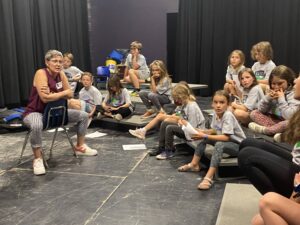 Center: And so, what did it mean to be the local liaison for that project?
Center: And so, what did it mean to be the local liaison for that project?
Ellen: Well, I wasn’t one of the teaching artists for one of her tour cities. Denver was not on the tour city list because of the timing. It would’ve brought her right in Febrero, you don’t want to be in Denver in Febrero. [laughs] So, we’re not on the tour list.
But one of the cool things that the Eden Engagement did is it created this curriculum, three actually, available for any person, music teacher, homeschooling mom, anybody, to download and utilize. And so, what I did is — first I checked, I said, “Really, we can just take this?” And they said, “Yes.” And I took it to my local Horizons school, which is in Boulder, and did a pilot workshop with them just to see if they liked it. And they loved it.
So what I am, is not directly affiliated with the tour cities, but kind of an offshoot, which is what they want, right? They want to plant the seed as it were, and then have it be picked up and together with Ars Nova Singers, who I sing with and who have a strong commitment to education, but mostly have been dealing with the high schoolers because we have apprentices and their education, they’re newly excited about maybe getting into the younger ones too and helping in that way. And so, that’s what this is. It’s an offshoot of an offshoot.
What we want to do is we want to be in every county in Colorado because there isn’t enough music in some of these areas.
Center: Okay, wonderful. So, I understand, so you have created this pilot program and you tried that out in Boulder. How will you be manifesting that at the Center? What does this project look like that we’re working on in the summer?
Ellen: This project is that same curriculum for whatever kids decide to join. And we’ll do the program. On the last day of the camp, we’ll invite the parents and anybody else that we want to invite.
What’s exciting about this program is that they create the song that we’re going to sing at the end. So, on Lunes of camp, I have no idea what the Viernes concert will be, because they haven’t written it yet. So there’s this evolution that’s going to happen throughout the week and it’s going to be really exciting.
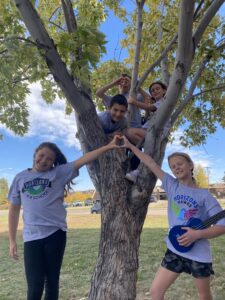 Center: And is this the Seeds of Hope that you mentioned earlier, which our Education Director, Kathy Kucsan, described to me as “a youth-based environmental workshop where kids write their own music based on what trees would sing.” Did I hit that right? Can you expand any more on that?
Center: And is this the Seeds of Hope that you mentioned earlier, which our Education Director, Kathy Kucsan, described to me as “a youth-based environmental workshop where kids write their own music based on what trees would sing.” Did I hit that right? Can you expand any more on that?
Ellen: Yeah, so we’re going to start the workshop by going outside, finding a tree, talking about what do you see in the environment that concerns you? Kids are so — they know. And they’re going to find their tree. And then what would the tree say to you? What would they say? If they could sing, what would they say to you?
And we’ll come back in and we’ll write that down, that trees say “Don’t do this, don’t do that. Help me do this.” And then we create melodies to what they’ve written. So, I had a girl and it became the refrain of our whole song, which was “We don’t want to be cut down.” That was what she thought the trees would say. And then they were working together and they came up with, [singing] “We don’t want to be cut down. We don’t want to be cut down.” That was kind of like their melody that they created.
And so, you take all of these words and these melodies and you just kind of create this basic song. It’s nothing crazy and complicated, but then later on you come to verse two and verse two is “What can we do?” What’s one thing, just one thing that you can do? And these kids are, it is Boulder County. They know about recycling, they know about all that, but they’ll have their little thing and that’ll be verse two.
And then the Seeds of Hope part is a separate song that was written by one of the first groups in the actual Eden tour. And so, we’ll also learn that song just because it’s beautiful and the kids will love it. And the pilot kids loved that song so much. I had to make sure I did it at the end of the day, so that they weren’t influenced by it. They loved it, it was so good.
Center: Oh, I really love hearing about them creating their own song. Can you tell me who the ideal participant is for this workshop? What age are they and how much music background should they have or not have?
Ellen: I think personally this is a golden opportunity for one of those kids — and K through 12, so, any age — who may be — obviously the choir kids, the singing kids, the drama kids, they’ll love it, come on in.
But it’s also an opportunity, it’s just a week, for somebody who maybe doesn’t want to commit to singing with a choir and wants to see what that’s like. So, I think that’s a great opportunity because it’s a couple hours a day and then you’ll know if you like choir or not.
And then of course there’s the nature lovers and the music kids who already know this is what they love.
But there might be a 7-year-old that likes to sing around the house and mom is wondering, do I do that? That’s a big commitment. Boulder Children’s Chorale, they have all of these things and you have to audition, blah, blah, blah. You don’t need any of that. Come try us out.
And the fun thing about Children’s Choir is it doesn’t even matter really if they sing amazingly when they begin, that’s not really the point. The point is coming together and creating this thing. That, the process, is what the camp is about, the end product of whether or not they sing like the Vienna Boys Choir, it doesn’t matter. They’re going to sing and they’re going to enjoy it and we can fine tune and make it pretty later.
Center: So, what I’m hearing from you is that this could be an introduction to music. Like you said, if there’s a burgeoning passion, but you haven’t had somewhere to point that energy yet. This would be a great way to put your toe in the water.
Can you tell me what the students will have learned or will have experienced by the end? It sounds like they will have worked together, they will have had a chance to share their own voice within this group, but are there other things that they will come away with at the end?
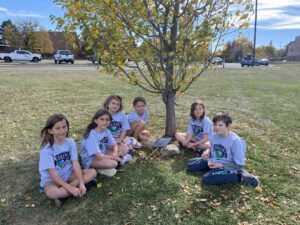 Ellen: They’ll also come away with the basics of what we do in choir. We always have to warm up. We warm up our bodies, we warm up our throats, we sing a lot of fun exercises. We do the alphabet really fast. They’ll learn some kind of “choir stuff” if they don’t know it. So, for the newer kids, they’ll understand what that is.
Ellen: They’ll also come away with the basics of what we do in choir. We always have to warm up. We warm up our bodies, we warm up our throats, we sing a lot of fun exercises. We do the alphabet really fast. They’ll learn some kind of “choir stuff” if they don’t know it. So, for the newer kids, they’ll understand what that is.
And then for the kids that have already been there, I think the big thing is the composition, they’re writing their own piece and learning… it’s not some esoteric somebody, some old guy, somewhere in a room, it’s you and go write your own music. When you go home, this is how you do it, this is how you write it. You come up with the words, you come up with the melody, and you do your own song.
Center: Sounds very creative and very empowering and very exploratory. It just sounds like a wonderful week. So, you mentioned that, so you are working with the Center for Musical Arts. I believe the Ars Nova Vocal Ensemble is involved. Are there other partners or how does everybody work together in this?
Ellen: Ars Nova Singers, which is a local acapella group — our concert is coming up in early Febrero [2024], come hear us — we do early music and late music. Acapella means no accompaniment and that’s great. And we have high school apprentices and that’s great. They have a big mission to serve in more of the education area. They don’t want to just be the singing group and this is a way for them to give back. So, they’re the umbrella under which I operate.
CMA, lovely, lovely, has offered to partner their space, so we can get the kids signed up, we can come in, we can teach this program, and we hope to do many, many workshops.
We’re the main things. I would say that another partner is ITAC, which is the International Teaching Artist Collaborative. And that’s an international group and we all support each other and we have meetings. We had one yesterday and just all sorts of support for teaching artists. And the reason I’m going to say they’re part of it is because the ones who produced the curriculum and make it available and all of that.
So, I would say they’re also partner, and Joyce, who is so excited that we’re doing this in [the Boulder/Denver region] because she grew up in basically Kansas City and used to come all the time to Colorado and loves Colorado but doesn’t want to be here in Febrero. So, she’s very excited that we’re going to take this here, a city that is a major city and should really be represented. So, she’s excited too.
Center: Sounds like there is so much support. It’s not a class where you come and just find your way through it. There’s so many people involved who have so much knowledge about music to help guide this class through that week-long workshop. What a great structure you guys have created.
So, I feel like I have a pretty good understanding of the project, which is happening this summer. Is there anything else that I haven’t asked you about that you think would be important for somebody who’s considering joining or isn’t quite sure if they should take part, or just anything we didn’t cover in general?
Ellen: I think the only thing I want to add, thinking about myself as a parent — I got to a point with my kids where I would drop them off at camps and go do my thing. But it depends on how many kids are in this camp. I had almost 40 in the pilot and I was really, really lucky that I had a couple parents willing to stay and help kind of herd the cats.
So, I think one little thing is just if you have a younger child and you’re not sure and you want to stay, you are welcome to stay. You are absolutely welcome. I mean, help then, don’t sit there and chat with your mom friend or whatever, but help if you want to. You’re welcome to. And you’re obviously welcome to drop them off and leave too. It kind of depends on the number. So, if I get more than 20, then I’m going to probably ask for some help because that’s a lot of kids. [laughs]
Center: Well Ellen, it’s been great to talk to you today and learn so much more about this really robust, really fascinating project. And as you mentioned, hopefully a partnership moving forward of all kinds of collaborations we can create together.
The piece that you mentioned that jumps out most to me is this idea of “you think someone else writes music, you can write music.” Any one of us should be creating, should be sharing our thoughts and our feelings, and our voice. And I think that all of music becomes richer as a result of that. And so, the space that you’re making for students to learn how they can add their voice to music in general, how they have the right to make up a song based on something they’re passionate about, I think that’s just really a gift to our students and to those who are maybe even coming to music for the first time.
Ellen: I agree. And it gives them advocacy. It literally gives them a voice to say something that they believe in. And we have a lot going on in the world, so they need to be able to speak about it.
Center: Well, it sounds like they’ll be in great hands and I’m just so grateful for you talking to me today. Thanks again and happy birthday once more.
Ellen: Thank you!
